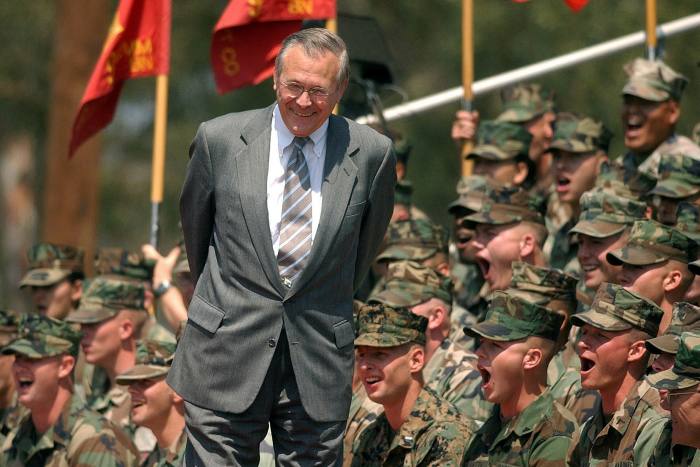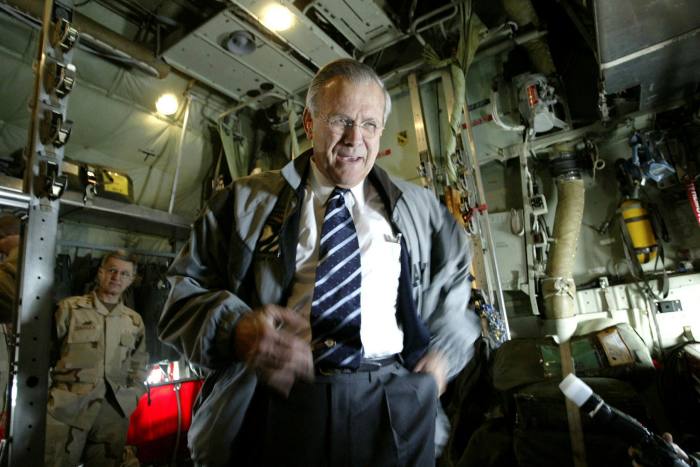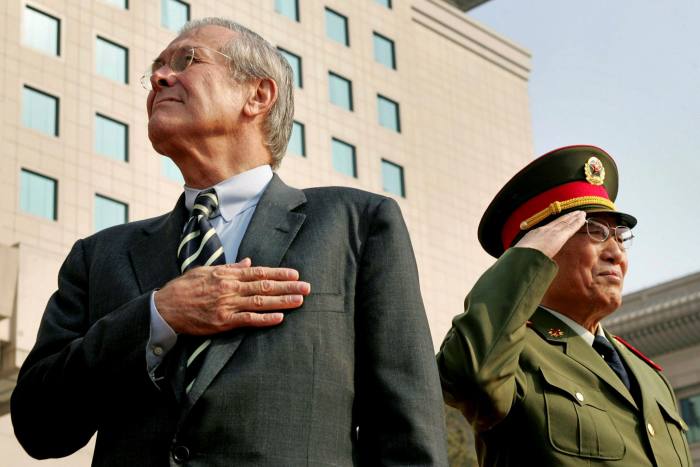
Donald Rumsfeld, US defence secretary, 1932-2021
Donald Henry Rumsfeld, who has died at the age of 88, had the unique distinction of being both the youngest and oldest man to serve as US secretary of defence. His stints in the job, separated by a quarter of a century, were shaped first by the cold war and then by what he called “the global war on terrorism”. They marked him out as a military strategist comfortable with challenging Washington orthodoxies and projecting American power abroad, a worldview he implemented with a self-confidence that bordered on arrogance.
It was his unwillingness to brook dissent that, critics argued, coloured his defining legacy: helping convince President George W Bush to invade Iraq in 2003 after the September 11 2001 terrorist attacks. Rumsfeld, who had supported attacking Saddam Hussein’s Iraq even before rejoining government as Bush’s defence secretary in 2001, became the invasion’s leading cheerleader within the administration. He overruled generals on deployment schedules and ignored diplomats urging him to conduct detailed postwar planning. He then bore much of the blame when a quick military victory against Saddam became a grinding counterinsurgency that the US was ill-prepared for.
Rumsfeld was born in the Chicago area on July 9 1932, the son of George and Jeanette Rumsfeld. He grew up in the Chicago suburb of Winnetka, where he became an Eagle Scout and attended New Trier High School. The Rumsfeld family also briefly lived in Coronado, California, during the second world war, when George served in the US Navy on an aircraft carrier.
After graduating from Princeton University, where he was on the wrestling team, Rumsfeld became a navy pilot in 1954. In the same year he married Joyce Pierson, with whom he had two daughters and one son.
After demobilisation in 1957, he went to work in Washington as a congressional assistant, before a two-year stint as an investment banker in Chicago. In 1962 he was elected to the US House of Representatives as a Republican from Illinois and served three terms. He resigned in 1969 to join Richard Nixon’s new administration as director of the Office of Economic Opportunity, a now defunct agency responsible for administering anti-poverty programmes. One of his first recruits there was Dick Cheney, who later as US vice-president was influential in bringing his mentor back to the Pentagon in 2001.


Rumsfeld prospered in the nation’s capital. In 1971 he was named director of the economic stabilisation programme and two years later was sent to Brussels as US ambassador to Nato. But Nixon’s resignation in 1974 brought him back home, first to run President Gerald Ford’s transition team and then as his White House chief of staff, with Cheney as deputy and later successor.
In 1975, aged 43, Rumsfeld became the youngest-ever secretary of defence. The circumstances of his appointment were inauspicious. His predecessor, James Schlesinger, was fired by Ford after repeated disputes with Henry Kissinger, then secretary of state.
Once installed in the Pentagon, Rumsfeld proved to be a wily bureaucrat. It looked as though he had inherited a poisoned chalice. The military was not only in the throes of a difficult transition to an all-volunteer force but also demoralised by its defeat in the Vietnam war. Additionally, the political tide had turned against increased defence spending.
He met these challenges head on, pushing for further reforms of the armed services, development of the cruise missile and the B1 bomber, a prototype of which he flew as a pilot, more ships for the navy and, naturally, a bigger budget. He justified his ambitious plans on the grounds that the threat posed by the former Soviet Union demanded nothing less, and in his first year, secured substantial extra federal funding.


But he also fell out with the military brass. He overruled them on a conservative design for the M-1 tank, designed as Nato’s primary fighting vehicle, by insisting that it accommodate both American and European sized guns. And he publicly disciplined General George Brown, then chair of the US joint chiefs of staff, after an undiplomatic outburst that, among other things, described the British army as “a pathetic sight”.
The Democratic victory in the 1976 elections prompted Rumsfeld to embark on a career in the private sector. He served as chief executive and later chair of GD Searle, the Chicago-based pharmaceuticals company, before running General Instrument Corp, a pioneer of high-definition television. From 1997 until 2001 he was chair of Gilead Sciences, a US drugmaker that was best-known for its HIV medications.


Though he did not return to cabinet during the Republican administrations of Ronald Reagan or longtime rival George HW Bush, he remained an influential spokesman on security issues, and briefly weighed running for president himself after Reagan’s second term ended in 1988. Named in 1998 by the Republican leadership in Congress to head a commission on ballistic missiles, he concluded that the threat posed by “rogue” states, such as North Korea, was grave. His report underpinned the case, adopted by George W Bush in 2001, for a national missile defence system. He also argued publicly that Saddam should be removed by force if necessary.
His return to the Pentagon in 2001 did not go smoothly at first. He immediately ordered a fundamental and wide-ranging review of the structure of the US armed forces but the consultative process that ensued alarmed the conservative military brass.
Rumsfeld was reluctant to push for a bigger defence budget. In one sense he was hamstrung, since the new Bush administration was intent on passing deep tax cuts and did not want to implement any large increases in departmental spending. But his reticence made him unpopular in some rightwing circles. By the summer of his first year, several pundits were calling for his replacement. That changed with the terrorist attacks on September 11 2001. After a jetliner was flown into the Pentagon, he rushed from his office to try to rescue those who were trapped, earning him admiration among staff.


Rumsfeld will be remembered not only for his bureaucratic prowess but also for his aphorisms. His admission in 2002 that there were “known knowns” and “known unknowns” about the Iraqi government’s programme for weapons of mass destruction, while initially mocked, became part of the political lexicon for leaders dealing with complex problems.
Rumsfeld resigned in 2006, after Republicans took a battering in the midterm elections amid growing public discontent over the Iraq war. He largely retreated from public life but published two books — a 2011 memoir entitled Known and Unknown and a 2013 advice volume called Rumsfeld’s Rules: Leadership Lessons in Business, Politics, War, and Life. He also participated in Errol Morris’s documentary about his life.
In his later years, he released a mobile gaming app called Churchill Solitaire, based on a version of the card game played by the late UK prime minister. And six months before he died, he co-authored an opinion piece in The Washington Post alongside nine other former US defence secretaries, warning that the military should not play a role in Donald Trump’s efforts to block Joe Biden from becoming president.
Stay connected with us on social media platform for instant update click here to join our Twitter, & Facebook
We are now on Telegram. Click here to join our channel (@TechiUpdate) and stay updated with the latest Technology headlines.
For all the latest Education News Click Here
For the latest news and updates, follow us on Google News.


